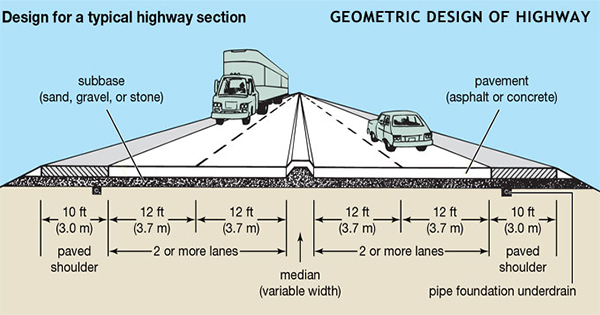Brief explanation of Highway Geometric Design

Geometric Design
Geometric design can be defined as follow :-
Geometric Design of highways takes care of the dimensions and layout of noticeable features of the highway.
It meets the necessities of the driver and the vehicle which range from comfort, effectiveness and security.
Perfect geometric design can allow minimization of accidents and their ferocity.
Objectives of geometric design:-
Increase the soothe, security and economy of facilities
Make the operation of traffic superior
Arrange greater safety at economical price
Reduce the ecological effects
Geometric Design is based on the following factors:-
Design speed
Topography
Traffic
Ecological factors
Vehicles attributes (dimension, weight, functioning properties etc)
Humans (the physical, mental and psychological aspects of the driver and pedestrians similar to the reaction time)
Road alignment:-
The placement of the outline of the central line of the highway on the ground is defined as the alignment.
Horizontal alignment comprises of straight and curved paths.
Vertical alignment contains level and gradients.
Alignment decision is vital as a worst alignment can raise the construction, maintenance and vehicle operating cost. As soon as an alignment is set and developed, it becomes difficult to modify it because of rising cost of nearby land and build up of costly structures by the roadside.
Types of alignment:-
Horizontal Alignment – Horizontal alignment in road design comprises of straight sections of road termed as tangents, attached with circular horizontal curves.
It refers to the design of the road in the horizontal plane.
Contains a wide array of tangents (straight lines), circular curves and transition curves.
Should arrange careful travel at an unchanging design speed.
Vertical alignment:-
Vertical alignment stands for the longitudinal section (presented on the y-axis of a road, it comprises of straight grades joined by vertical curves).
Vertical alignment indicates the elevations of points along the roadway.
To get more information, watch the following video.
Video Courtesy : Short Notes

